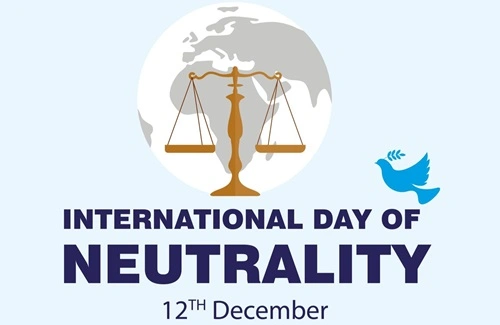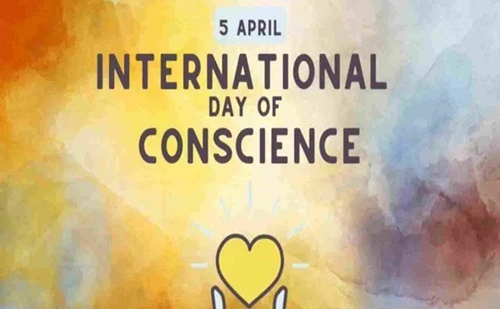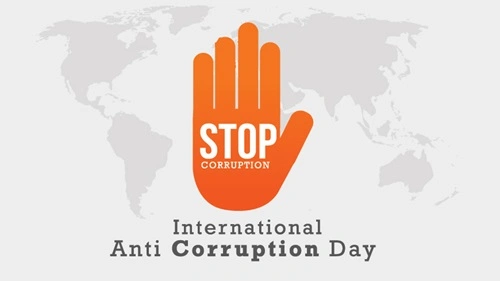The International Day of Neutrality, observed annually on December 12, is a United Nations-designated day that underscores the importance of neutrality in fostering peace, stability, and development. Neutrality, in international relations, refers to the policy of a state refraining from participating in armed conflicts and maintaining an impartial stance. This day serves as a reminder of the critical role neutrality plays in diplomacy, conflict resolution, and promoting international cooperation.
History and Origins

The International Day of Neutrality was established by the United Nations General Assembly (UNGA) in 2017 through Resolution 71/275. The day recognizes neutrality as a fundamental principle in international relations, particularly in preventing and resolving conflicts.
The observance was inspired by the neutral foreign policy of Turkmenistan, which was officially recognized by the UN in 1995. Turkmenistan’s neutrality has been a model of how non-alignment and diplomacy can contribute to regional and global peace.
The Concept of Neutrality
Neutrality is a legal and political status in which a state commits to:
- Non-Participation in Conflicts: Refraining from engaging in wars or supporting any party involved in armed conflicts.
- Impartial Diplomacy: Maintaining balanced relations with all states, regardless of their alliances or disputes.
- Promoting Peaceful Relations: Acting as a mediator in international disputes and fostering dialogue among conflicting parties.
Neutrality is enshrined in international law, particularly in the Hague Conventions of 1907, which outline the rights and responsibilities of neutral states.
Significance of International Day of Neutrality
Neutrality is more than a political stance; it is a principle that contributes to global stability and development. The International Day of Neutrality emphasizes:
- Conflict Prevention and Resolution: Neutrality allows states to mediate disputes, reduce tensions, and facilitate peaceful negotiations.
- Promoting International Cooperation: Neutral states often serve as platforms for dialogue and cooperation, bridging divides between conflicting parties.
- Humanitarian Contributions: Neutrality enables states and organizations to provide impartial humanitarian aid in conflict zones.
- Sustainable Development: By avoiding conflicts, neutral states allocate resources to development, education, and healthcare rather than military spending.
Examples of Neutrality in Action
Neutrality has been a cornerstone of peace and stability in various regions:
- Switzerland: Renowned for its longstanding policy of neutrality, Switzerland has hosted numerous peace negotiations and international organizations, such as the Red Cross.
- Turkmenistan: Recognized as a permanently neutral state, Turkmenistan actively promotes regional peace and economic cooperation in Central Asia.
- Sweden: While not officially neutral, Sweden’s non-aligned foreign policy has enabled it to mediate international conflicts and provide humanitarian aid impartially.
These examples demonstrate how neutrality can contribute to building trust and fostering collaboration on a global scale.
Challenges to Neutrality
While neutrality offers many benefits, it is not without challenges:
- Erosion of Neutrality: In an increasingly polarized world, maintaining neutrality can be difficult due to economic, political, or strategic pressures.
- Perception Issues: Neutral states may be perceived as passive or uninvolved in addressing global challenges.
- Balancing Relationships: Neutral states must carefully navigate their relationships with conflicting parties to maintain impartiality.
- Global Crises: Issues like terrorism, climate change, and pandemics require collective action, which can challenge the neutrality of states.
Despite these challenges, neutrality remains a vital tool for conflict prevention and international cooperation.
How International Day of Neutrality is Observed
The International Day of Neutrality is marked by various activities worldwide to promote the principles and benefits of neutrality:
- Educational Campaigns: Workshops, seminars, and discussions are organized to raise awareness about the role of neutrality in peacebuilding and diplomacy.
- Cultural Events: Art exhibits, music performances, and film screenings highlight stories of neutrality and its impact on global peace.
- Policy Dialogues: Governments and international organizations use the day to discuss strategies for conflict prevention and the role of neutrality in achieving sustainable development.
- Media Outreach: Social media campaigns, articles, and public service announcements amplify the importance of neutrality in today’s world.
Neutrality and the United Nations
Neutrality aligns closely with the principles and objectives of the United Nations, particularly in:
- Conflict Resolution: Neutrality supports the UN’s efforts to mediate disputes and prevent wars.
- Peacekeeping: Neutrality ensures impartiality in peacekeeping missions, fostering trust among conflicting parties.
- Humanitarian Assistance: Neutrality facilitates the delivery of aid to vulnerable populations without bias.
The UN actively promotes neutrality as a tool for achieving its mission of maintaining international peace and security.
How You Can Contribute
Individuals and organizations can support the principles of neutrality by:
- Advocating for Peace: Promote dialogue and understanding within your community to address conflicts peacefully.
- Supporting Humanitarian Efforts: Donate to or volunteer with organizations that provide impartial aid in conflict zones.
- Raising Awareness: Share information about the importance of neutrality on social media and encourage discussions about its relevance.
- Educating Yourself: Learn about the history and impact of neutrality in international relations and its role in global stability.
Looking Ahead: The Future of Neutrality
In a world marked by increasing tensions and complex challenges, neutrality remains a beacon of hope for peaceful coexistence. The principles of impartiality, dialogue, and cooperation that underpin neutrality are essential for addressing global issues such as climate change, economic inequality, and armed conflicts.
As nations and individuals continue to embrace neutrality, its potential to foster a more peaceful, inclusive, and sustainable world will only grow.
Conclusion
The International Day of Neutrality is a powerful reminder of the role neutrality plays in maintaining global peace, preventing conflicts, and promoting cooperation. It calls on nations and individuals to prioritize dialogue, understanding, and collaboration over division and conflict. By honoring the principles of neutrality, we can contribute to a more stable, equitable, and harmonious world. Let us celebrate this day by recommitting ourselves to the values of peace and impartiality that neutrality represents.

